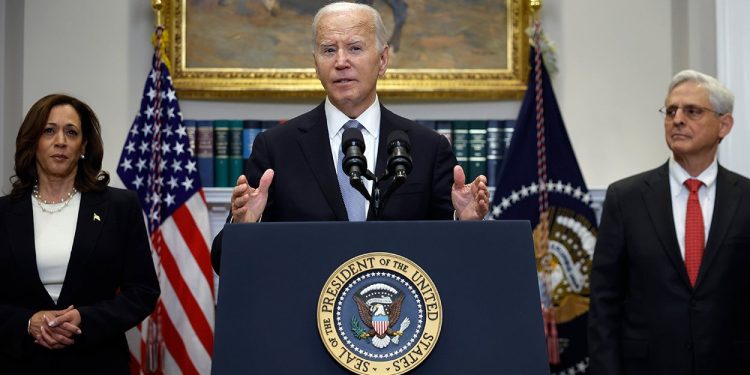(Daily Signal)—The Biden-Harris Justice Department is wrong in claiming that federal law bars Virginia and other states from removing aliens from their voter rolls. And if the law DOJ cites is misinterpreted by a court to agree with the agency’s erroneous claim, then the law likely would be unconstitutional.
The Justice Department sued Virginia after it removed the names of 6,303 aliens and Alabama after it moved 3,251 aliens to an “inactive” list.
Keep in mind that it’s a felony under several federal statutes for an alien to claim fraudulently to be a citizen so he or she may register to vote or vote in U.S. elections, including 18 U.S.C. §§ 611, 911, and 1015(f). The Justice Department has a duty to enforce these statutes, something the agency apparently has no interest in doing under President Joe Biden and Vice President Kamala Harris.
The federal voter registration form established by the National Voter Registration Act, or NVRA, not only asks applicants whether they are U.S. citizens, it requires them to attest under penalty of perjury that they are citizens.
The form has a strict warning that if the would-be voter provides false information, he or she may “be fined, imprisoned, or (if not a U.S. citizen) deported from or refused entry to the United States.”
However, the Justice Department claims that Virginia and Alabama violated the law’s 90-day preelection deadline for “systematic” list maintenance programs. This, according to the DOJ led by Attorney General Merrick Garland, prevents all “systematic” removals from a voter registration list within 90 days of an election.
What the Justice Department fails to point out is that the 90-day deadline is in the second part of a section of the National Voter Registration Act that deals only with the removal of the names of registered voters who have moved.
The first part outlines the rule for removing the names of individuals who have moved to a different residence either within the state or another state. The second part then applies the 90-day deadline for such removals.
That section of the law also says that the deadline doesn’t apply to “correction of registration records” or to removal of names of voters who have requested it or who have died or become ineligible due to a criminal conviction or mental incapacity.
The common factor in all of those exceptions is that each deals with individuals who were eligible to vote when they registered but subsequently became ineligible.
The 90-day deadline obviously doesn’t apply to an alien who wasn’t eligible to register to vote in the first place and, in fact, was committing a felony violation of federal criminal law by registering.
Critics, including the Justice Department, have claimed that those exceptions are the “exclusive” reasons that a state may remove the names of registered individuals from the voter rolls.
In 2012, in Arcia v. Detzner, a federal case out of the Southern District of Florida, Judge William Zloch said that claim would “produce an absurd result.”
Zloch ruled that would mean a state couldn’t “remove from its voting rolls minors, fictitious individuals, individuals who misrepresent their residence in the state, and non-citizens.”
The 90-day deadline, the judge decided, “simply does not apply to an improperly registered noncitizen.”
In another 2012 federal case, U.S. v. Florida, Judge Robert Hinkle of the Northern District of Florida concluded that Congress drafted these provisions of the law to deal with the removal of names of registered voters “on grounds that typically arise after an initial proper registration.” The provisions don’t apply to “revocation of an improperly granted registration of a noncitizen,” Hinkle ruled.
In fact, the judge wrote, “the NVRA does not require a state to allow a noncitizen to vote just because the state did not catch the error more than 90 days in advance.”
Moreover, the Justice Department is also wrong in claiming that the law bars all “systematic” removals of voters’ names.
As Hinkle ruled, during the 90-day period “a state may pursue a program to systematically remove registrants on request or based on a criminal conviction, mental incapacity, or death but not based on a change of residence.”
What “matters here,” the federal judge added, “is this: none of this applies to removing noncitizens who were never properly registered in the first place.”
It is true that in a deeply flawed, cursory analysis, a divided panel of the 11th U.S. Circuit Court of Appeals overturned the Southern District of Florida decision and held that the 90-day deadline did apply to the removal of aliens’ names from voter rolls.
But Florida didn’t appeal this obviously wrong decision by two appeals court judges to the entire 11th Circuit or to the Supreme Court. The 11th Circuit panel’s decision not only is wrong based on the text of the statute, but any interpretation of the National Voter Registration Act that would force a state to allow an ineligible alien who violated criminal law by registering to remain registered so he may cast a ballot in an upcoming election likely would render the law unconstitutional.
In 2019, in Bellitto v. Snipes, another case arising out of Florida, a different 11th Circuit panel held that in applying the NVRA, “Congress would not have mandated that the state register” an individual who “is not eligible to vote.”
If the NVRA does not require a state to register an ineligible alien to vote, it cannot be construed to require a state to maintain and continue the registration of an ineligible alien.
Alabama and Virginia should fight the Justice Department and be willing to take these cases all the way to the Supreme Court. Maintaining the security and integrity of the American election process and protecting voters against foreign interference that voids their votes requires no less.
Read Hans von Spakovsky’s complete Legal Memorandum: “The National Voter Registration Act Does Not Prevent States From Removing Aliens from Voter Registration Rolls at Any Time.”






